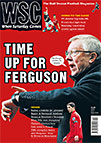 Seb Patrick mantains that it is becoming harder to admire or support a player who has lots of skill but repeatedly damages his club’s image
Seb Patrick mantains that it is becoming harder to admire or support a player who has lots of skill but repeatedly damages his club’s image
It’s difficult not to imagine that Luis Suárez has a “goodwill meter” that he lets fill up to a certain point before jettisoning all of it in one go. Having arrived in England fresh from serving a ban for biting PSV’s Otman Bakkal – and with his part in Ghana’s exit from the 2010 World Cup still fresh in the memory – it took a quick adjustment to English football for people to start thinking maybe he wasn’t so bad after all.
Then came Patrice Evra and an incident that – without raking over that sorry situation again – tarnished his reputation to what was, for some, an unrecoverable extent. Nevertheless, being arguably the standout performer over the course of a full Premier League season can do wonders for a player’s standing. While he would never be the most loved individual, by early spring of this year there was grudging tolerance from most quarters. Evidently this level of approval was too much for him to take – so came his latest, and perhaps most defining, self-destructive act: the unfathomable and apparently unprovoked biting of Branislav Ivanovic’s arm during a largely meaningless match against Chelsea.
The reactions to this incident have run the gamut from amused lack of interest to think-of-the-children hysteria (thanks, Mr Cameron), but in particular it has left Liverpool fans again wondering whether being associated with Suárez’s bizarre and unpredictable behaviour is a worthwhile price to pay for the benefits of his undeniable talent. Whatever your feelings on the severity of the FA’s punishment – and the entirely separate debate on consistency that it opens up – it’s clear that to anyone who cares about how their club conducts itself, Suárez is now an actively damaging presence.
Liverpool fans are far from the first to have to try to resolve the dilemma of principles versus desire for success. Duncan Ferguson and Eric Cantona both remained firm cult figures at their respective clubs despite acts of violence that, while not as downright bizarre as Suárez’s, were closer to (or actually) outright criminality. The forgiving reaction of Everton and Manchester United fans had much to do with the respective players’ acceptance of wrongdoing, not to mention their existing standing. The question does remain, however, of just what a player has to do in order to become a figure that fans will not cheer for, no matter how positive their contribution to the team’s play. One wonders how the majority of Birmingham City fans feel about Marlon King trousering £15,000 a week, regardless of how many goals he provides in return; or whether Lee Hughes’s contribution to Notts County’s 2010 promotion success made it harder to celebrate the achievement.
The likelihood is that, while pre-match discussion may involve disapproval, it’s a lot harder to stick to one’s guns when swept up in a game itself – is it possible to choose not to instinctively cheer a vital goal just because of the identity of the scorer? Yet it’s hard to escape the feeling of discomfort in some of these cases. Nobody would reasonably deny those who have served their time the right to a living but the high-profile and community-centred nature of a football club would seem to carry with it a certain responsibility – meaning that a club becomes more difficult to “support”, wholeheartedly, if it fails to distance itself from such behaviour.
And it’s the reaction of the club to his misdemeanours that seems to be the biggest problem with Suárez. The strange thing about him is that off the pitch he doesn’t come across as an especially unpleasant person, nor does he seem to be someone who sets out to cause trouble – at least until the moment it occurs. Yet Liverpool’s reputation is suffering badly, not so much just for having him in the team but for the way they attempt to deal with him.
The reaction to the Evra incident was laughable – or it would have been, if closing ranks around someone accused of racial abuse didn’t have such wide implications – but the immediate aftermath of the Ivanovic bite was scarcely any better. The club stopped short of defending Suárez but were slow and indecisive – missing the opportunity to follow Ajax’s lead and impose a playing ban of their own.
And this is why, while Suárez’s on-pitch value easily outweighs almost routinely spending chunks of the season without him available, for many fans it increasingly feels like he’s simply not worth the hassle. A few weeks ago, the question was whether or not Liverpool would be able to resist lavish continental offers for him in the summer transfer window. Now, a good portion of Anfield are hoping that they might still encourage one.
From WSC 316 June 2013